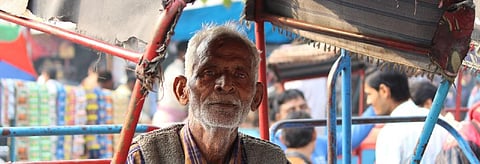

It is known by now how the nationwide lockdown to curb the spread of the novel coronavirus disease (COVID-19) hit the majority of India’s population hard. The Narendra Modi government claimed its interventions protected those vulnerable, but several experts differ.
The Union government recently said it provided financial assistance to approximately 390 million beneficiaries worth Rs 34,800 crore through Direct Benefit Transfer (DBT) through May 5, 2020. The assistance was provided under the Pradhan Mantri Garib Kalyan to protect the beneficiaries from the impact of the lockdown.
The relief transfer, however, has been marred with exclusions, because of no unified database of the vulnerable or poor sections of the society.
Nobel laureates Amartya Sen and Abhijit V Banerjee and former Reserve Bank of India governor Raghuram Rajan have suggested measures to benefit an exhaustive section of the Indian population as has Jean Dreze, who works among some of the poorest rural Indians.
A section of economists have pointed out exclusions in the government relief; stranded migrant workers without ration cards, seasonal or circular workers in unorganised, semi-formal sectors such as construction - who are not registered with the labour department as well as those without access to formal banking.
Banerjee recently pointed out the inadequacies of welfare schemes and policies and said some cash should be handed over soon to the bottom 60 per cent of the population without wasting time and energy in finding “deserving beneficiaries”.
India distributes cash or in-kind benefits under different schemes since 2013, when DBT was first introduced.
Each of these schemes have their own list of beneficiaries, different criteria and different delivery channels. The Mahatma Gandhi Employment Guarantee Act (MGNREGA) has 90 million registered workers, the National Food Security Act (NFSA) has 810 million beneficiaries, Pradhan Mantri Kisan Samman Nidhi (PM-KISAN) over 140 million and the Pradhan Mantri Ujjwala Yojana with over 80 million.
The Union government, however, by its own admission in a report on DBT in 2016, highlighted the inadequacy of the database used to target or identify beneficiaries.
The report said each ministry / department maintains its own database, used as a base for transferring benefits. These databases, at multiple levels, not only duplicate effort but hamper the process of aggregating subsidies to individuals as well.
Those included as beneficiaries have not received benefits in many cases. Six hundred three million beneficiaries, for example, received foodgrains against 810 million covered under the NFSA.
Banerjee, in a conversation with Congress leader Rahul Gandhi, said schemes like MGNREGA and NFSA were worked out on the assumption that anybody who is not where they are supposed to be is actually working and earning an income and the state does not have to worry about them.
“Post-lockdown, this assumption collapsed and we find a large number of people — especially migrants — not covered by those schemes,” he said.
In the absence of a below poverty line (BPL) list (India conducted its first BPL survey in 1997), moreover, a unified database is a prerequisite in a crisis situation such as this.
This is what several experts said about delivering relief measures as well.
According to Shweta Saini, a senior consultant at non-profit policy think-tank Indian Council for Research on International Economic Relations:
We have to find ways to link existing databases of different welfare schemes and make them speak to each other
The government report on DBT also suggested a unified beneficiary database that needed to be made by capturing the unique Jan Dhan account, Aadhaar, mobile number (JAM) details of each beneficiary.
It stated that the universal database will need to be dynamic, linked to birth / death registration and changes in family structures arising from events like marriage.
“The database will also need to be maintained at local level and aggregated at higher levels. These unique details of beneficiaries shall help the government in effective scheme planning or creation and eventually lead to holistic realisation of subsidy outlays,” said the report, adding that a national level portability of benefits and services would then be possible.
There are, however, no current efforts to bring lists of different beneficiaries together.
The government should not fear duplication or ineligible individuals getting relief, said Anjani Kumar, Research Fellow at research centre International Food Policy Research Institute.
“If the government was interested in including everyone, it could have also used income tax, Permanent Account Number information,” Kumar said.
“In this situation, it is more dangerous to leave behind one individual than having two ineligible individuals included,” he added.
Banerjee said something to a similar effect.
“Some money will be stolen. But if we sit on our hands and say we don’t want to do anything that could go possibly wrong, then we’ll make sure it goes wrong,” he said.
Dominant castes, elite groups and other entrenched lobbies could well corner a part of the food rations and cash, according to Banerjee. But that is a risk, he felt, worth taking to tide over the crisis.
The financial assistance from the government includes Rs 16,394 crore allocated as payment to 81.9 million beneficiaries under the first instalment of PM-KISAN, Rs 12,810 crore credited to 256.2 million women who have Jan Dhan accounts, Rs 1,405 crore to about 28.2 million elderly individuals, widows and those who are disabled, with Rs 3,492.57 crore to 22 million building and construction workers.
Over 603.3 million beneficiaries have received around 36.35 lakh million tonnes of foodgrains in the past two months.